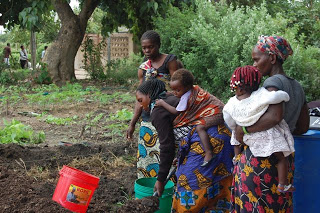It’s an overcast, breezy Sunday afternoon, and I just finished chopping up a large pumpkin to make into soup. I picked it up from one of the vegetable stands on the side of the road between Kafue and Lusaka yesterday. It’s such a relief to get out of the chaos and traffic of the city, pass the giant Lafarge cement factory in Chilanga and the last pothole, and then be on the slightly rolling road back home, surrounded by green fields and small hills spotted with the random thatched roof hut.
I was wishing that we had grown a field of pumpkins in one of our gardens, especially since the bright orange flesh of the ripe ones makes an excellent and nutritious addition to porridge for the Infant and Young Child Feeding cooking demonstrations. In addition, being a local vegetable, the seeds are available for next to nothing, and they grow well with little effort or attention. Alas, they also require large amounts of space – excellent for growing under maize stalks in the fields – and so the only pumpkin plants we have in our gardens are confined to a small area and used primarily for their leaves, which, when cooked with tomatoes, onions, and salad oil, are a favorite in the local cuisine.

A recent exciting development here has been the chance to liaise with mothers2mothers, an organization founded in South Africa that provides support and education for HIV+ mothers and works toward the prevention of mother-to-child transmission of HIV. In Zambia, they are also well-integrated into clinic activities, and they offer weekly cooking demonstrations for mothers of underweight under-5-year old children. Zambia has a surprisingly high rate of malnutrition in under-5s, and m2m staff teach mothers how to use local foods to prepare nutritious meals that will help their children to gain weight and grow well. The vegetables coming from our gardensare easily integrated into the demonstrations; at three different clinics our produce has been used to prepare such things as zucchini porridge, spinach porridge, spinach and eggplant with mincemeat, and cooked green beans with tomatoes.

While emphasizing the nutritional value of gardening at the more advanced sites, we are still putting in new clinic gardens and expanding our gardening education programs. The site at Kafue Estates (site #3) has finally taken off; on Friday we had a large crowd of mothers and members of the ART support group digging a new bed, watering, planting nurseries, and making compost. Beginning this week, we will offer a series of four weekly gardening classes to teach the principles of organic and sustainable gardening using locally available resources, and participants who demonstrate commitment and interest will be selected and assisted in setting up home and community gardens in areas that the clinic serves.

We have passed the halfway point of this project, which leads to a lot of thought about the long-term sustainability of the gardens and their impact on individuals and communities. We want to empower people with knowledge and skills that they will not only retain and practice but will feel confident in sharing with others. Thus, in addition to the organic gardening classes, we are also planning a “Gardening for Nutrition” training that will give each participant the ability to teach about the nutritional importance of the gardens, especially in regard to specific populations, such as pregnant mothers, people living with HIV and AIDS, and underweight children. Individuals who participate in both the organic gardening classes and the Gardening for Nutrition training will serve as leaders as we expand the home gardening program, and they will be representatives and teachers of gardening and nutrition in their communities.
At the moment we’re functioning on quite a few different levels – from planting new seeds (and getting excited about cool season crops like carrots and kale!) to organizing trainings, from cooking up delicious nutritious vegetable dishes to helping groups track sales and expenses and make business management plans. Sometimes it can be a challenge to keep everything moving along smoothly, but it seems that no matter which direction we turn, we receive advice, support, encouragement, and enthusiastic responses. Thanks especially to CIDRZ (Center for Infectious Disease Research in Zambia), who is sponsoring this project, to the local offices of the Ministries of Health and Agriculture, to clinic staff and volunteers, and to all the participants!

